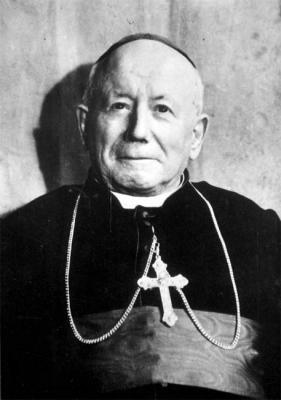Monsignor Saliège, the Archbishop of Toulouse, was an active and vigorous supporter of Jews who endeavored to improve the Jews’ situation in the detention camps of southwestern France. As early as November 23, 1941, Saliège sent a protest letter to the Vichy authorities against their Jewish policy, even as the rest of the French Catholic hierarchy maintained silence or supported this policy. Saliège obtained precise information about the first deportations, in August 1942, from the detention camps to the Drancy transit camp. On Sunday, August 23, 1942, priests in all churches in the archdiocese of Toulouse read out his public protest:
“Women and children, fathers and mothers treated like cattle, members of a family be separated from one another and dispatched to an unknown destination - it has been reserved for our own time to see such a sad spectacle. Why does the right of sanctuary no longer exist in our churches? Why are we defeated? . . . The Jews are real men and women. Foreigners are real men and women. They cannot be abused without limit. . . . They are part of the human species. They are our brothers, like so many others.”
Overnight, the document became a manifesto; hundreds of thousands of copies were made and were circulated by members of the Resistance throughout France. Historians consider Saliège’s protest vastly influential in the abrupt turnabout in French public opinion at that time, in which support for the Vichy regime plummeted. The protest also paved the way to practical action in frustrating the anti-Semitic policies of the French gendarmerie and the occupation authorities alike. Saliège instructed the clergymen and nuns in his archdiocese to hide Jews, particularly children. Saliège’s adjutant, Bishop de Courrèges was appointed to coordinate activities to save Jews by Church institutions in the archdiocese of Toulouse. At the instruction of the Ministry of the Interior, the town prefect applied pressure, accompanied by threats, in an attempt to deter the priests from reading Saliège’s protest from their pulpits. The Archbishop withstood these pressures with great courage and nobility of spirit. The authorities then tried to impugn his prestige and spiritual authority by publishing incendiary statements, but they did not dare to silence or punish the Catholic leader, who remained energetic despite his advanced age and poor health.
On July 8, 1969, Yad Vashem recognized Archbishop Jules-Gérard Saliège as Righteous Among the Nations.







